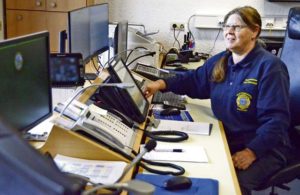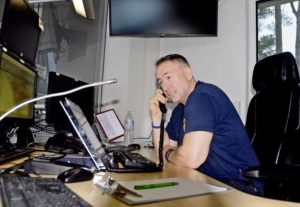
When Americans call 911 in an emergency situation, they expect a calm, knowledgeable voice on the other end. And that’s what they get when they reach the emergency dispatchers for U.S. Army Garrison Rheinland-Pfalz.
In Germany, the phone number for fire and medical emergencies is 112, and the number for police is 110. Those numbers connect callers to a German emergency operator who will transfer the call to an English-speaking dispatcher. However, garrison dispatchers emphasized if those in need of assistance can’t remember which number to call, they can still dial 911.
“The garrison has 12 dispatchers between Rhine Ordnance Barracks and Baumholder. They handle about 1,000 emergency calls for service each year,” said Marshall Fiedler, garrison fire chief. “Their performance has been excellent.”
The USAG RP dispatchers, who are all bilingual local nationals, work 24-hour shifts similar to firefighters, taking calls from garrison kasernes stretching from the Coleman Work Site in Mannheim to Miesau Army Depot. The average call taking-time — the time from picking up the phone, recording the vital information needed, then dispatching emergency crews — is just 70 seconds, according to Fiedler.
“We deal with law enforcement and fire stations. Every shift begins with radio checks and signing on the systems,” said Carlos Moenko, a dispatcher for 13 years, the last six years with the garrison. “A lot of it is pretty normal stuff. Occasionally, we get the chance to help save lives.”

During their shift the two dispatchers on duty tag-team their responsibilities. They test and monitor all of the fire alarm and communication systems, conduct proficiency and qualification training, test phone communications with all fire stations twice a day, coordinate and provide translation services when the local community dispatchers need help and coordinate and transfer emergency calls to the Ramstein dispatch center as needed. Somewhere among all that and emergency calls, they alternate taking required sleep breaks.
Alisha Braun has been a USAG RP emergency dispatcher for two years, but emergency service has been a part of her life since she began volunteering at her local fire department when she was 11 years old.
“It was always my biggest dream to work in a fire department,” she said. “We learned a lot about the rigors of the fire department, we got a lot of training and a lot of fire safety instruction.”
For calls into the German emergency numbers, “As soon as they hear English, they hit the transfer button,” explained Moenko. “The connection is instant.”
Moenko related a story where a call was transferred to him for a man who was barely conscious in a truck and hard to understand.
“It was clear that he was in and out of consciousness and I was trying to figure out where he was,” he said. “I called the German police and told them where I thought he was and listened as they got there. That was a good one.”
Unfortunately, not every emergency call has a happy ending.
“In my first year, I had an American spouse call just after her Soldier husband had committed suicide,” Braun recalled. “I provided translation for the German fire department in her town. It was a horrible call.”
Moenko says dispatchers understand when someone calls 112 or 911 that they are usually not calm. But, he asks that they try to remember the who, what and where of the event they’re calling about. Otherwise, it can delay the emergency response.
Ute Sponheimer has been a dispatcher on military installations for 33 years, 18 of those on Smith Barracks in Baumholder. She said she had to get up to speed quickly because the 9/11 terrorist attacks happened in her first week on The Rock.
“Quickly, we started getting a lot of calls about suspicious cars and people walking around taking pictures and that kind of thing as the gates were closed and people started worrying about security,” she recalled.
Sponheimer said she’s been a person who helps other people since her childhood. When she’s not at the dispatching console, she’s a German Red Cross volunteer. She said she feels like she was meant to be a dispatcher.
“Dispatchers get both kinds of calls. I remember helping the German dispatchers with a Bulgarian man having a heart attack. It took a long time to figure out where he was between him being somewhere on the autobahn and the language barrier. But, I heard the ambulance get there and they saved him,” she recalled. “The worst call I had was talking to a new mother who just found her newborn dead from Sudden Infant Death Syndrome. You have to stay calm and professional, but your heart breaks for them.”
“The dispatchers are the first voice customers hear when they need help. They are the first, and most important, link in the emergency response chain,” Fiedler said. “The information they gather, the reassurance they give to the caller, and their actions to dispatch first responders are vital to our department’s continued success.”







